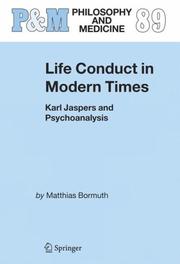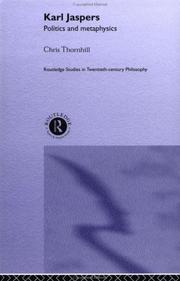| Listing 1 - 3 of 3 |
Sort by
|

ISBN: 1280625279 9786610625277 1402047657 1402047649 9048171881 Year: 2006 Volume: 89 Publisher: Dordrecht Springer
Abstract | Keywords | Export | Availability | Bookmark
 Loading...
Loading...Choose an application
- Reference Manager
- EndNote
- RefWorks (Direct export to RefWorks)
The German version of this book received the main award in 2001 of the prestigious Stehr-Boldt-Fonds of the University of Zürich for scientific research combining questions of medical ethics with social interest. This award-winning book investigates the critique of psychoanalysis formulated by the psychiatrist and philosopher Karl Jaspers (1883-1969) over a period of five decades. His arguments against Freud and his followers are examined from systematic perspectives. The study traces the medico-historical roots of Jasper’s criticism of psychoanalysis and then places it within the framework of scientific theory before devoting itself extensively to medico-ethical aspects of the controversy, which are ultimately treated in terms of a history of mentalities. According to this view, Jasper’s student Hannah Arendt saw to it that the philosopher be made aware of the socio-cultural impact which psychoanalysis was beginning to have in the U.S.A. The philosopher came to look upon psychoanalysis as a theory – in particular as it was propagated after 1945 in Germany and the U.S. – whose claim to scientific objectivity constituted a serious threat to the freedom of the individual. Max Weber’s theory of science and his concept of modernity serve as a critical guide for the interpretation. Thus the normative premise of the investigation is the liberal idea that in a secular and pluralistic society it is ultimately the individual who is to take responsibility for life conduct.
Psychoanalysis --- History. --- Jaspers, Karl, --- Germany --- Biography --- History --- Ethics. --- Deontology --- Ethics, Primitive --- Ethology --- Moral philosophy --- Morality --- Morals --- Philosophy, Moral --- Science, Moral --- Philosophy --- Values --- Jaspers, Karl --- ヤスパアス, カール --- Yasbarz, Kārl, --- Yaspers, Ḳarl, --- I︠A︡spers, K. --- I︠A︡spers, Karl, --- Yasŭpʻŏsŭ, --- Yasŭpʻŏsŭ, Kʻal, --- Ya-ssu-pʻei, --- Ya-ssu-pei-ssu, Ka-erh, --- יאספרס, קרל, --- Jaspers, Karl Theodor, --- 卡尔·雅斯贝斯

ISBN: 0415408350 1315014556 1136454098 9781136454097 9781315014555 9781136454165 9781136454233 9780415269063 9780415408356 1136454160 Year: 2006 Publisher: London Routledge
Abstract | Keywords | Export | Availability | Bookmark
 Loading...
Loading...Choose an application
- Reference Manager
- EndNote
- RefWorks (Direct export to RefWorks)
This book sets out a new reading of the much-neglected philosophy of Karl Jaspers. By questioning the common perception of Jaspers either as a proponent of irrationalist cultural philosophy or as an early, peripheral disciple of Martin Heidegger, it re-establishes him as a central figure in modern European philosophy.
Giving particular consideration to his position in epistemological, metaphysical and political debate, the author argues that Jaspers's work deserves renewed consideration in a number of important discussions, particularly in hermeneutics, anthropological reflections on relig
Jaspers, Karl, --- Jaspers, Karl --- ヤスパアス, カール --- Yasbarz, Kārl, --- Yaspers, Ḳarl, --- I︠A︡spers, K. --- I︠A︡spers, Karl, --- Yasŭpʻŏsŭ, --- Yasŭpʻŏsŭ, Kʻal, --- Ya-ssu-pʻei, --- Ya-ssu-pei-ssu, Ka-erh, --- יאספרס, קרל, --- Jaspers, Karl Theodor, --- 卡尔·雅斯贝斯

ISBN: 0739112317 0739115065 9780739112311 9780739115060 Year: 2006 Publisher: Lanham Lexington books
Abstract | Keywords | Export | Availability | Bookmark
 Loading...
Loading...Choose an application
- Reference Manager
- EndNote
- RefWorks (Direct export to RefWorks)
Literature and history --- Meinecke, Friedrich, --- Jaspers, Karl, --- Mann, Thomas, --- Brecht, Bertolt, --- Germany --- History --- Intellectual life --- History and literature --- History and poetry --- Poetry and history --- Jaspers, Karl --- Mai-nieh-kʻo, --- Mann, Paul Thomas --- Mann, Thomas --- マン・トオマス --- マン, トーマス --- Brecht, Berthold Friedrich --- Brecht, Bertolt. --- Brecht, Bertholt --- Brecht, Bert --- Brecht, Eugen Berthold Friedrich --- Man, Tomas, --- Man, Tʻomasŭ, --- Mān, Tūmās, --- Manas, Tomas, --- Mani, Tʻomas, --- Mann, Paul Thomas, --- Mann, Tomas, --- Mann, Tomasz, --- Thomas, Paul, --- Манн, Томас, --- מאן, תומאס --- מאן, תומאס, --- מאן, טאמאס --- מאן, טאמאס, --- מן, תומס --- מן, טומס --- מן, טומס, --- مان، توماس --- ヤスパアス, カール --- Mai-nieh-kʻo --- 卡尔·雅斯贝斯
| Listing 1 - 3 of 3 |
Sort by
|

 Search
Search Feedback
Feedback About UniCat
About UniCat  Help
Help News
News